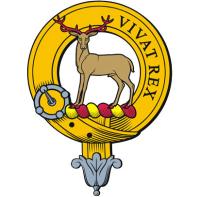
Clan McCorquodale
The McCorquodales are a recognised Scottish clan by the Lord Lyon King of Arms. However, they have been without a chief since sometime in the 1700s, when the last Baron McCorquodale died, thus making them an armigerous clan.
McCorquodale comes from the Gaelic name MacCorcadail (or MacThorcadail) meaning "son of Torcadal". The name can also be seen in Gaelic in the forms of MacChorcadail and MacThor.
The Gaelic given name Torcadal is of Norse origin meaning "Thor's kettle" (or is sometimes known as, in a more romanticised way, "cauldron of the thunder spirit").
Research shows that the barony of Phantelane is the oldest barony in Scotland; the lands granted to McCorquodale by The King of the Scots, Kenneth MacAlpine, in the 9th century for great deeds in battle. This grant of land was carried out by the Leum Scobhaig, or the flight of the Hawk. It is in this barony that the remains of Tromlee Castle lie; a historic seat of the McCorquodales.
In 1430, Ewan Mactorquedil or Ewgyne M'Corquheddell was requested to appear before the sheriff in Perth, as well as being told to bring with him any charters and evidents.
It was recorded that Ewen Mikcorcadill granted his lands, including Edderlin, in 1495, to Archibald, 2nd Earl of Argyll (d. 1513), in exchange for other lands.
In 1612, the brother of Duncan McQuorquordill of Phantellane, Lauchlane McQuorquordill, and Johnne Dow McQuorquordill (or McQuorquhordell) were called "notorious thieves and assisters of Clan Gregour".
Records show a McCorquodale was still the owner of the Barony of Phantellands in 1645, and it
was eventually John Campbell, 4th Duke of Argyll, who took over the lands of Phantilands in
1721 on the death of Duncan MacCorquidill to repay a debt. Apparently the barony survived intact for 800 years. A Baron McCorquodale is later recorded as in charge of the United Company: 27 companies of men fighting on the side of the 3rd Duke of Argyll in 1745.
In 1747 parliament enacted the Heritable Jurisdiction Act that stripped the Clan Chiefs of their Feudal Powers. At this point the lands were lost.
The name is relatively common in the Kintyre area. Shortened forms of the name include MacCorkill and MacCorkle, and both are still in current use.
The Maccorquodales are noted as being a sept of the MacLeods, however, there is no evidence to suggest any link between the two families.
Variations of the name include: M'Corcadill, M'Cordadill, M'Corqudill, M'Corquidle, M'Corquidill, M'Corquydill, M'Korkitill, McQuorcadaill, Macquorquodale, Makcorcadell, and Makcorquidil.
Additional information kindly provided by Niall MacLeod.






